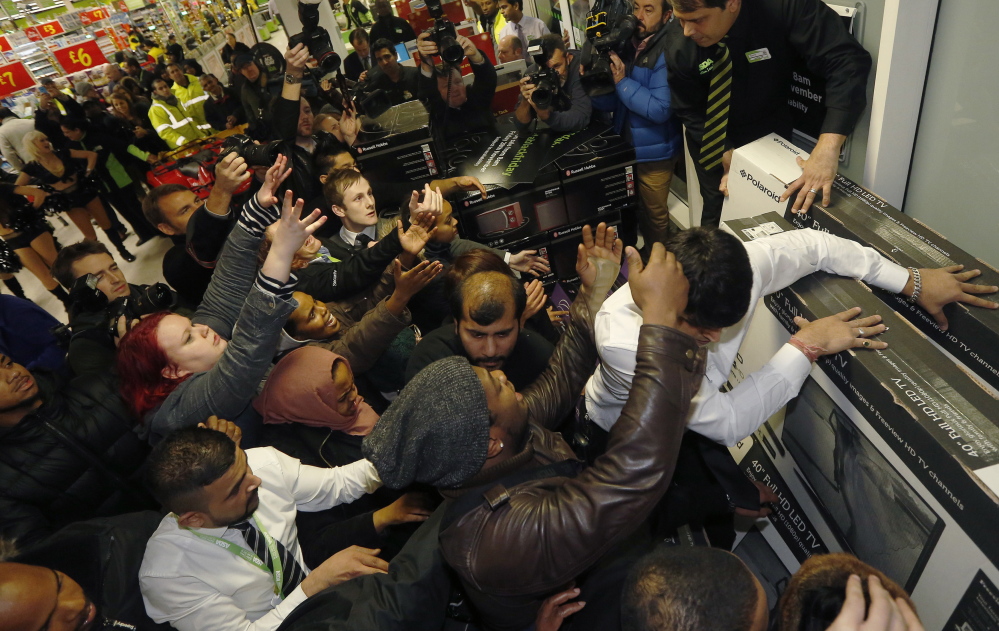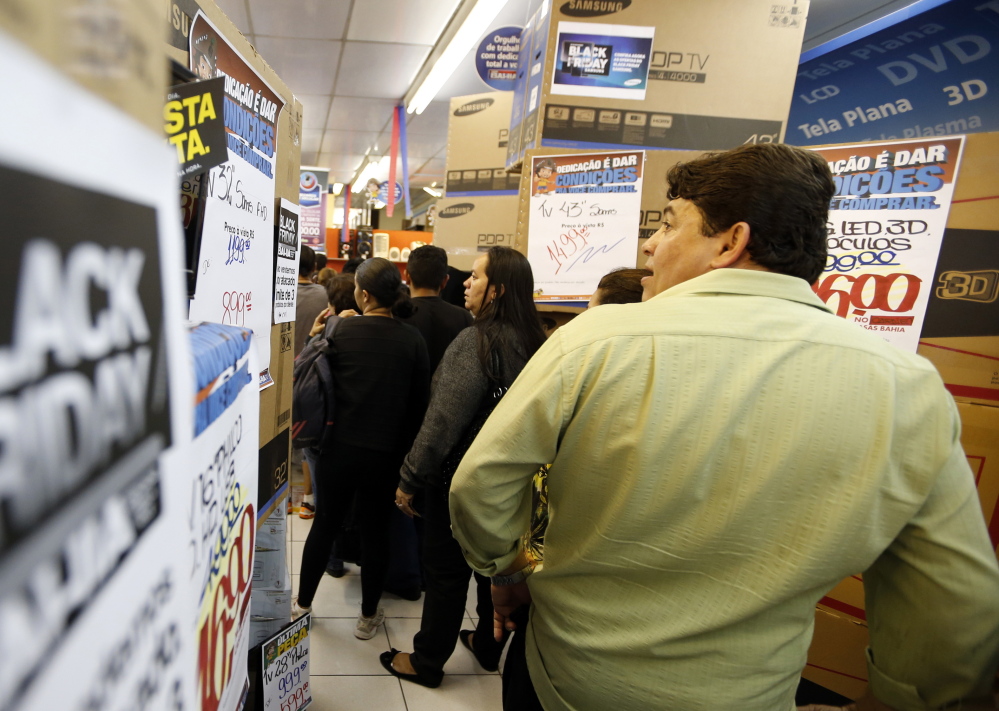LONDON — As a Londoner, Hannah Lyons wasn’t having turkey and pumpkin pie on Thursday, but that doesn’t mean she wasn’t preparing for that other Thanksgiving ritual: looking for deep discounts at the mall Friday.
“I’ve got my credit card at the ready,” the 30-year-old business fashion student said while shopping at the Westfield White City mall in London’s Hammersmith borough.
Black Friday, the annual rite of retail that commands American attention the day after Thanksgiving, is catching on around the world. Though the U.S. is the only nation to gather for a family meal on the fourth Thursday in November, people from London to Leipzig to London, Ontario, are starting to rush big-box stores the following day.
The trend of discounts to kick off the Christmas shopping season – a staple of U.S. retailing for decades – reached neighboring Canada about five years ago, though Canadians celebrate Thanksgiving in October. The rise of the Internet has made it a worldwide phenomenon, as customers are always just one click away from the deals offered by U.S. e-tailers, even if shipping fees often erase the price advantage.
“The consumer is savvy,” said Chris Morton, chief of Lyst, a London-based online fashion marketplace that expects a sixfold increase in traffic outside the U.S. this weekend due to Black Friday promotions. “She knows a massive sales event happens in the U.S., and with e-commerce she can tap into that.”
In Costa Rica, authorities have warned consumers to beware of counterfeit goods offered in “Viernes Negro” sales. Germany’s Conrad Electronic is in the midst of what it calls Black Week, with deals such as 14 percent off a Samsung LED television. South African supermarket chain Checkers has promised to cut prices by as much as 50 percent for Black Friday promotions.
Even in France, where discounting is highly regulated, supermarket operator Casino Guichard-Perrachon, media retailer Groupe Fnac and online store La Redoute are slashing prices for what some call “Le Black Friday.” La Redoute has 55 percent markdowns on Braun laser hair removers, Casino is offering what it says are unbeatable prices on Nespresso coffee machines, and its online unit, CDiscount, will introduce Black Friday promotions in all eight countries where it operates, including Senegal, Vietnam and Colombia.
Swedish online retailer CDON Group, which introduced the Black Friday concept last year, said sales that day were more than double those of an average Friday as it had 1.2 million website visits, 70 percent more than normal.
In Britain, Amazon.com introduced the idea in 2010, and it has since spread to at least a dozen big chains, with Marks & Spencer Group and J Sainsbury this year joining for the first time.
“Amazon did the groundwork in terms of increasing knowledge and awareness of the event,” said Kantar Retail research analyst Bryan Roberts. Now “tactical bandwagon climbing” by other retailers has turned Black Friday into the biggest fixture on the British shopping calendar after Dec. 26, Boxing Day. The trend got a boost last year when Asda, owned by Wal-Mart Stores, discounted goods like TVs and gaming consoles, Roberts said.
British shoppers were expected to spend 200 million pounds, or about $316 million, more Friday than the average, according to researcher Mintel. That would be about 20 percent more than a typical December Friday, and roughly double the increase last year, Mintel said.
“Black Friday now marks the real start of Christmas shopping,” said Rob Hattrell, general-merchandise director for Tesco Plc, which will extend discounting to stores tomorrow after starting with online sales last year.
Another American import: a frenzied rush to get the best deals. Last year, at an Asda in Belfast, Northern Ireland, a woman was sent to the hospital after she injured her arm in a crush of shoppers seeking the “earth-shattering savings” promised. This year, the company says it’s increasing staffing with “thousands more” sales clerks and security personnel.
The danger for retailers is that Black Friday sales will depress, rather than kick-start, Christmas shopping, said Nick Bubb, an independent retail analyst in London. The final two months of the year are the most lucrative for British retailers, representing an even greater proportion of annual revenue than in the U.S.
“There’s a huge risk that consumers will buy what they would have bought anyway, just for less,” Bubb said. “It’s ruining margin.”
A primary concern is that retailers won’t be able to return to charging full price in the traditionally lucrative month of December, Selfridges’ operations director Sue West said at a retail conference.
Black Friday “is going to change the whole shape of Christmas this year,” she said. “It’s vitally important that it’s a full-price trading period” after this weekend’s discounts.
For that reason, Kingfisher Plc is approaching the concept gingerly. Its British home-improvement division, B&Q, will offer a half-price Bosch pressure washer and 30 percent off a Makita drill, but discounts will be limited when compared to those of superstore competitors, the company said.
“We’re tiptoeing in,” Ian Cheshire, Kingfisher’s chief executive officer, said. “You have to be quite careful about getting on a discount drug.”
Copy the Story LinkSend questions/comments to the editors.




Success. Please wait for the page to reload. If the page does not reload within 5 seconds, please refresh the page.
Enter your email and password to access comments.
Hi, to comment on stories you must . This profile is in addition to your subscription and website login.
Already have a commenting profile? .
Invalid username/password.
Please check your email to confirm and complete your registration.
Only subscribers are eligible to post comments. Please subscribe or login first for digital access. Here’s why.
Use the form below to reset your password. When you've submitted your account email, we will send an email with a reset code.